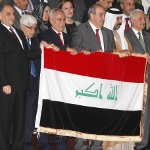At first glance, the Sunni political scene in Iraq on the eve of the March 7 parliamentary elections appears to be an incoherent mosaic of political parties. There are two main coalitions, however, that are expected to win most of the Sunni vote; the remaining parties reflect the community’s diverse ideological and political views but are unlikely to pack much of an electoral punch. There are new variables in the Sunni community that distinguish these elections from those of 2005 and even from the 2009 provincial elections. Most importantly, these elections will expose the changing balance among various forces within Sunni politics as a subset of the larger Iraqi political equation.
From Boycott to Participation
The upcoming elections will clarify, through voter turnout rates, the general attitude within the Sunni community toward political participation. Sunnis will either move toward further incorporation into the political process or will remain susceptible to rejectionists who want to keep Sunnis within the framework of armed resistance—or at least with one foot in the political game and the other out. Those advocating armed resistance and a boycott of the political process were dominant in the Sunni political scene in the wake of the 2003 U.S. invasion, when only a handful of personalities and parties (such as the Iraqi Islamic Party, and the Iraqi Accord Front) embraced the political option. Although these parties took part in the 2005 parliamentary elections, the prevailing Sunni position was to boycott, reflecting dominance of armed factions (especially al-Qaeda) at that time.
By 2007, serious disagreements emerged among the militant groups, on many occasions taking the form of armed combat between al-Qaeda and other forces such as the Islamic Army or the 1920 Revolution Brigades. The formation of the tribal Awakening Councils constituted a further Sunni reappraisal of the political situation and the utility of using force, and revealed growing Sunni opposition to al-Qaeda and Iran. Last year’s provincial council elections provided another indicator of the Sunnis’ evolution, with rising voter turnout and a diverse range of actors including Islamist, tribal, and secular parties.
The Rejectionists
Some Sunni groups, with various ideological perspectives, nonetheless continue to boycott politics and embrace militant activism. Former Vice President Azzat al-Douri leads the Baathists; it is unclear how much support they command as opposed to the various Islamist groups, which eschew any loyalty to Saddam Hussein and nationalist ideas. The Jihad and Reform Front is close to the Muslim Scholars Association, which is led by Harith al-Dari. The Front includes a number of leading factions, most prominently the 1920 Revolution Brigades and al-Rashideen Army, and boycotts politics at present.
Among the armed factions is the Islamic State of Iraq, under the leadership of Abu Omar al-Baghdadid, comprised of al-Qaeda and its allies. Although it has been on the defensive for the past two years, the last few months have seen a resurgence of its headline-grabbing attacks. Another force to be reckoned with is the Political Council for the Iraqi Resistance, which represents four leading armed factions: the Islamic Army, Hamas-Iraq, the Islamic Front for the Iraqi Resistance (JAMI), and the Shari’a Committee of Ansar al-Sunna. Among the armed factions, the Political Council is the most receptive toward possible political involvement; it recently entered talks in Turkey with representatives of U.S. forces, although they bore no fruit. While the Political Council is continuing to boycott elections, the spokesman for JAMI, Abdullah al-Hafed, recently told a Qatari newspaper that the resistance would not target election centers. Sources close to the Political Council suggest that it might even quietly back some Sunni candidates.
Shifting Alliances and Blocs
Meanwhile, the number of Sunni parties taking part in the political process has grown and electoral coalitions have shifted. The biggest change, which applies to the Iraqi political scene at large, is the emergence of cross-sectarian coalitions and signs that political rhetoric is becoming more secular. This applies to newer entrants to the political field (such as the Awakening Councils) as well as to older, more established players.
This cross-sectarian feature is clearly dominant in the Iraqi National Movement, comprised of the Iraqi National Accord led by former Iraqi Prime Minister Iyad Allawi, a secular Shi’i whom a broad range of Sunnis consider an acceptable candidate. He is joined by the Sunni former Vice President Tariq al-Hashemi, as well as Usama al-Nujeifi , his brother Atheel al-Nujeifi, Adnan al-Pachachi, and a number of minor coalitions and figures. Observers expect this coalition to compete strongly for the Sunni vote against the Iraqi Accord Front, which until now has been the strongest representative of Arab Sunnis. The front is spearheaded by the Iraqi Islamic Party led by Osama al-Tikriti, his deputy Eyad al-Samarrai, as well as Mohsin Abdul-Hamid.
Meanwhile, the Unity Alliance of Iraq under former Interior Minister Jawad al-Bolani (who is Shi’i) was also able to find allies within the Sunni community, particularly among the Awakening Council leaders such as Ahmed Abu Risha (leader of the Awakening Council of Iraq in Anbar), the former advisor to the Awakening Councils Abu Azzam Al-Tamimi, and the National Charter Gathering under Ahmed Abdul-Ghaffur al-Samarrai.
The State of Law coalition, led by Iraqi Prime Minister Nouri Al-Maliki, has won the support of only a few Sunni tribal and political figures. This is also the case with the Iraqi National Alliance, which includes the main Shi’iparties competing with al-Maliki (the Iraqi Supreme Islamic Council, the Sadrists, Ahmed al-Chalabi’s Iraqi National Congress, and Ibrahim al-Jaafari from the National Reform Movement).
Now that the pre-electoral strategic positioning and alliance-making has drawn to a close, the ball is in the court of the Sunni voters. Through their participation, they will answer two key questions. Will Sunnis embrace the political process decisively, which would curb armed resistance? And will Sunnis take advantage of intra-Shi’i divisions and increase their clout by voting overwhelmingly for a single coalition—or split their votes and limit their influence?
Muhammad Abu Rumman is a Jordanian scholar and writer. Paul Wulfsberg translated this article from Arabic.






